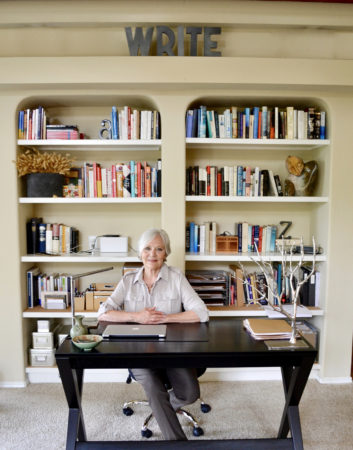The author and philanthropist shares her best advice for engaging in Austin’s nonprofits.
Story and photo by Courtney Runn
 Joy Selak lightheartedly laments that everyone she meets immediately shares his or her entire life story with her. Even though she’s at times taken aback by the quick vulnerability, it’s easy to understand why people feel so comfortable with her. She exudes the calm and peace of someone who has been through great trials and triumphed on the other side.
Joy Selak lightheartedly laments that everyone she meets immediately shares his or her entire life story with her. Even though she’s at times taken aback by the quick vulnerability, it’s easy to understand why people feel so comfortable with her. She exudes the calm and peace of someone who has been through great trials and triumphed on the other side.
Selak started her career in education before becoming a financial advisor, a position she never thought of leaving. After chronic illness interrupted her corporate career and idyllic island life along the coast of Washington, Selak found her purpose in philanthropy.
When she and her husband moved to Austin in 2001, she quickly started volunteering, serving in a variety of roles at Zach Theatre, Mindpop and A Legacy of Giving. She currently serves as a philanthropic advisor for Rodman & Associates and is adapting a play she wrote into a novel.
Selak’s impressive list of careers—educator, financial advisor, entrepreneur, writer, philanthropist—infuses her outlook with a maturity, grace and wisdom that allow her to see the nonprofit sector holistically. Here are her top tips for those looking to get more involved.
Do some research before you commit to philanthropy.
“[Ask yourself,] ‘Where is my deepest passion?’ ”
Support social media.
“A wonderful way to support nonprofits you believe in would be to give them a budget to bring on a social-media consultant and a communications consultant, and let them work to tell that organization’s story in a powerful, simple, immediate way.”
Consider your past pain.
“People come out of [trauma]often with vigor and hearts for others. Ignoring it or pretending it didn’t happen or being angry about it—none of it will serve you. Once you’ve made peace with it, you can use it.”
Get your kids involved.
“When you start young like that, it is your identity. I don’t think you could not be sensitive to the needs of others. I don’t think you could not try to find ways to help.”
Believe you can make a difference.
“Don’t discount the impact one human can have on another human. Know you’re just wrong if you think it’s insignificant. It’s not.”


